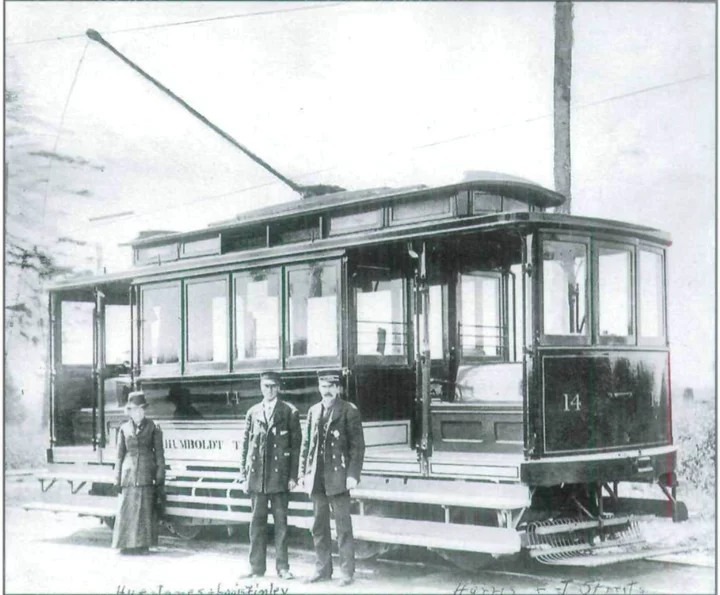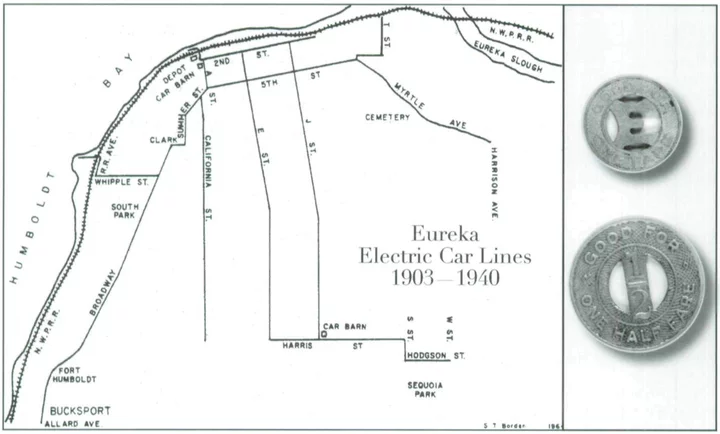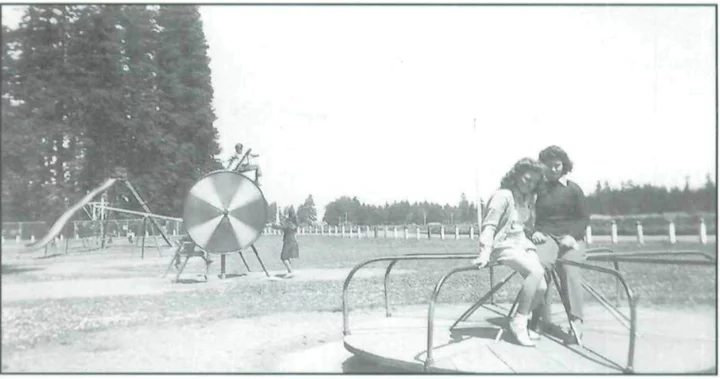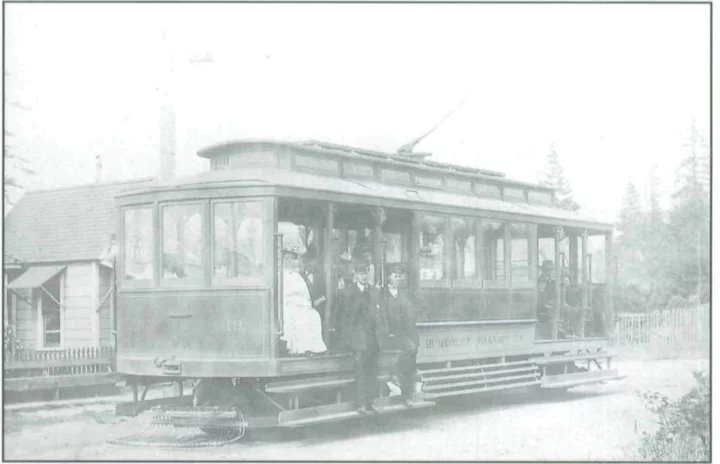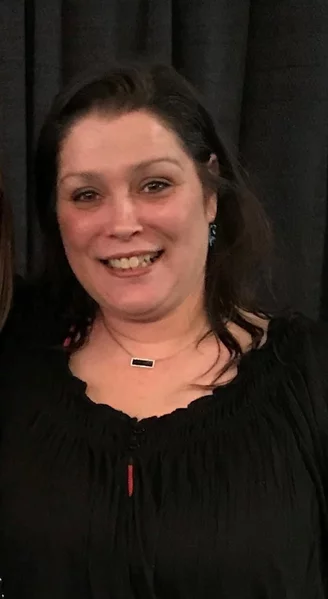(PHOTOS/VIDEO) Flyin’ High at the Second Annual Redwood Coast Kite Festival
Stephanie McGeary / Sunday, May 21, 2023 @ 12:17 p.m. / Event
One of the kite performances synced to music at the Redwood Coast Kite Festival | Photos, video: Stephanie McGeary
###
It’s a bird…it’s a plane…it’s a giant whale flying above Eureka!
You may have noticed kites in the shape of whales, squid, fish and and all sorts of other creatures and shapes flying near the Eureka’s waterfront this weekend. That’s because the second annual Redwood Coast Kite Festival has taken over Halvorsen Park for two days of kite-centered fun!
This is the second year of the kite festival in Eureka, put on by Humboldt Kiters, a DreamMaker project of the Ink People. Mark Ahrens, local kite enthusiast and event coordinator for the festival, told the Outpost on Saturday that the turnout for the festival was very good and that it is starting to become well-known among avid kiters across the country.
“We’ve become a destination point,” Ahrens said during a quick interview on Saturday afternoon. “It’s pretty awesome because the kiting community has said ‘this is the real deal.’”
The festival, Ahrens added, is actually a reboot of the original Redwood Coast Kite Festival that started on the Samoa Peninsula in 1992 and was eventually moved to southern Oregon. Like so many events, the festival was canceled during the pandemic and has not returned since. The idea to bring the festival back came about after some local kiters started meeting in Halvorsen Park during COVID lockdown. Ahrens said that it started with just a couple people and then, as people realized it was a fun and safe activity to do outdoors during COVID, the kiter group grew larger.
After learning that the Oregon kite festival would not be coming back post COVID, Ahrens and a group of other local kiters decided that they needed to fill the void. They started the nonprofit Humboldt Kiters and put together the festival and Halvorsen Park in 2022.
This year, the festival has grown to include more professional kite performances with sport kites, food vendors and a wellness area with a blood mobile and DHHS booth. There were also artisan vendors selling local clothing, jewelry, crafts and — of course — kites!
If you missed the event on Saturday, the Redwood Coast Kite Festival continues at Halvorsen Park in Eureka today (Sunday, May 21) until 5 p.m.
“Come on out and have fun,” Ahrens said.
Scroll down for a few more photos.
BOOKED
Today: 7 felonies, 9 misdemeanors, 0 infractions
JUDGED
Humboldt County Superior Court Calendar: Today
CHP REPORTS
Us101 N / Humboldt Hill Rd Ofr (HM office): Traffic Hazard
Dows Prairie Rd / Grange Rd (HM office): Traffic Hazard
5500 Mm101 N Men 55.00 (HM office): Assist with Construction
ELSEWHERE
Governor’s Office: Governor Newsom statement on Palisades Fire arrest
KINS’s Talk Shop: Talkshop October 8th, 2025 – Rex Bohn
RHBB: Ishi Pishi Road Closed October 14-20 for Culvert Replacements
GROWING OLD UNGRACEFULLY: I Don’t Do Fiction
Barry Evans / Sunday, May 21, 2023 @ 7 a.m. / Growing Old Ungracefully
My stock response, when someone asks me if I write fiction or non-fiction, is something like, “Well I hope it’s non-fiction.” Fiction eludes me, and I marvel at and respect those who tackle it — we have several talented and successful fiction writers right here in Humboldt County.
My problem with fiction is this: I’ll have what I (a legend in my own mind) think of as a brilliant start. Sometimes it’s just a sentence, other times a paragraph or two, or a few lines of dialog. Then, perhaps 100 words in, I’ll run out of steam.
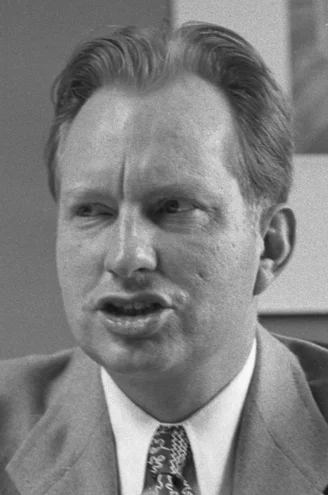
L. Ron Hubbard, the champ. Photo: Public domain, via Wikimedia.
100 words! Here’s what real writers output, daily.
- Anne
(Interview with a
Vampire) Rice: 3,000
words
- Michael (Jurassic Park) Crichton: 10,000 words
- Ernest Hemingway: 500 words (but what words!)
- Stephen King: 2,000 words
- L. Ron Hubbard, founder of Scientology, published 1084 works (250 fiction) in his lifetime, making him the world’s most prolific writer according to Guinness.
Making my efforts look a bit silly. But I have a column to write, so here are some recent efforts for you to waste the next five minutes on. Or not. As I say, I don’t do fiction.
God’s Barber
Over the millennia, Julce’s drinking problem got worse and worse. Every hundred thousand years or so, he’d try to quit, but sobriety never took, and he was the only one God trusted with his beard, so he kept his job despite his addiction. It all came to a head the day Junior (as the angels insisted on calling Him) arrived, ascending in a cloud of glory, seraphim and cherubim ushering Him up through the clouds. And oh my, was he a mess! He’d never washed up after His messy demise — hands and feet were particularly disgusting — and His hair was still matted with blood from the thorns. It fell to Julce to clean him up…
…who was having a particularly bad day, having stumbled on a jar of fermented manna the previous evening.
Jasmine
“Excuse me, but aren’t you the the guy in that movie?”
I gave her an enigmatic smile.
“My God! You are! I loved it, especially the scenes with, um, Jennifer?”
“She was a lot of fun to work with,” I said, trying to sound discreet.
“Would you mind terribly if I got a selfie with you?”
Up close, she smelled of jasmine.
“Look, I know it’s crazy, but…”
“It’s OK, I’m traveling incognito. Even my agent doesn’t know I’m here. Dinner?”
She gave a little whinny.
I love being the guy who looks like the guy in that movie.
Nine of Hearts
When I was an aspiring magician, I barely missed a single show of Harry’s. Afterwards, I’d tell him how I thought he did it, figuring out almost all of his illusions. I begged for more.
“Buy a deck of cards, pick one and put it in your pocket.”
We met the following night: “Nine of hearts.”
“How…?” I spluttered.
He put his finger on the side of his nose. “Shtum.”
Yesterday I visited him, a frail old man in his hospital bed.
“Harry, I’ve been going crazy for 40 years. How did you do it?”
He smiled. “I guessed.”
Three False Starts
“Time to wake up,” she thought, “This dream’s been going on for far too long.” But…
###
“It’s going to be another long night,” said the waiter at the all-night coffee shop. He glanced over at the foursome in the corner of the restaurant. I looked at the black-leather clad gaggle of teens, not seeing anything out of the ordinary, until I realized…
###
Something about the envelope made me anxious. No return address, just my name and address scrawled in purple ink. How did they know my first name? Everyone here knows me by my middle name, yet here it was, “Philip Barry Evans,” large as life. I tore open the envelope…
HUMBOLDT TEA TIME: Arcata Mayor Sarah Schaefer Tells Us About Governing Her Home Town in an Age of Potentially Transformative Growth
LoCO Staff / Saturday, May 20, 2023 @ 3 p.m. / People of Humboldt
She was born in Arcata. Now she’s the mayor!
Today on Humboldt Tea Time, host John Kennedy O’Connor is honored to be joined by Sarah Schaefer, an Arcata native who became a high school teacher and then mayor of the whole goddamn town.
What led her into public service? What’s it like to be involved in Arcata government, at a time of great transformation in the city, and in the county generally? How is the city getting along with Cal Poly Humboldt, and with its neighboring communities? Will she seek reelection next year, and will that decision be affected by whether or not she can afford to buy a house in her home town?
Today’s official tea time snack is Sweet Potato and Goat Cheese Bites, which you will make with Cypress Grove, of course. Tuck in, press play.
THE ECONEWS REPORT: Protecting 30% of California by 2030
The EcoNews Report / Saturday, May 20, 2023 @ 10 a.m. / Environment
California has set a bold conservation goal to protect 30% of its lands and coastal waters by 2030. This “30x30” goal aligns with a global 30×30 movement to protect nature all around the world to avoid an extinction crisis.
The Power in Nature Coalition brings together environmental organizations, activists, and tribal nations to collectively push Sacramento to meet its 30x30 target. Advocates are urging the state to fund and protect key strategic lands and waters that will protect biodiversity, allow for better public access to the outdoors, and help to naturally sequester carbon. Josefina Barrantes of the Power in Nature Coalition joins Dan Sealy of the NEC and Matt Simmons of EPIC to chart a path forward for conservation.
SCENE REPORT: Humboldt is Goth as Heck! Here’s a Brief and Incomplete History of the Local Goth Culture, With Some Scenesters’ Thoughts on Why Goth Rules
Eduardo Ruffcorn-Barragán / Saturday, May 20, 2023 @ 7:16 a.m. / Scene Report
Goth Night. Photo courtesy Danica Avińa.
Subcultures are inherently a part of how we relate to one another. Broadly defined, a subculture is made up of a group of people that have beliefs or interests veering away from the larger culture they are already a part of. Often, a subculture is seen as a rebellion to the mainstream culture
Take Humboldt’s goth scene.
The goth subculture emerged from the New York punk rock scene in the late 1970s and early 1980s. Rumor has it that goth culture landed in Humboldt County somewhere in the 1990s, but it is tough to say precisely when. Regardless of when goth made it to Humboldt, there is a pattern that keeps it alive and it goes like this — there is no goth scene, goths start to find each other, some of them start holding local goth events, then something stops the goth scene. Repeat.
The interesting part of all this is that goth people are always here. The thing that changes is whether or not spaces are opened up to goth events. With each iteration, the goth scene is reborn with the same soul but a different personality.
Some of the earlier public gatherings of the goth community began with Marjhani BellaMorte. BellaMorte, 48, moved to Humboldt County in 2008 to help some friends with the opening of a tattoo studio in Arcata but it was in 2009 when she began to meet more goths like herself. They would meet at the Greenwood Cemetery in Arcata to hang out, listen to music and drink wine, all while being goth.
In 2011, BellaMorte decided to take it a step further. She wanted more gothiness. At first Bella Morte approached a few places to see if it was even possible to hold an event, but was met with resistance. So instead, this small group of goths started what was called Weirdo Wednesdays, where they would take over the Alibi in Arcata.
“They really didn’t want to support anything goth so we just showed up in our gothy goodness with 40 bucks and took over the jukebox,” BellaMorte said.
Weirdo Wednesdays consistently saw about 10-16 people every week, and it lasted for approximately five months. There were attempts to do something similar at The Shanty in Eureka, but the turnout was not enough. Soon after, The Jambalaya in Arcata let the goths hold a monthly goth night. They called it Club Deliverence.
BellaMorte would decorate the interior walls and tables to transform The Jam into a goth club. This all lasted roughly four to five months before some changes at The Jam forcibly stopped Club Deliverence.
After that, the club found a new home at the Nocturnum Nightclub in Eureka. Within only two months in this new home, the Nocturnum Nightclub permanently closed its doors and Club Deliverence died with it.
BellaMorte kept goth alive as long as she could while her career as a professional belly dancer was taking off. She created a gothic dark fusion style of belly dancing and began teaching it internationally. That, coupled with her son graduating high school in 2014, led to her decision to move back to SoCal.
The goth scene didn’t end with BellaMorte. It pivoted into the hands of a young man named Ian, and he held a goth event over at Siren’s Song Tavern in Eureka. Twenty-one years old at the time, Ian held the ranks for a few years while he went to school. By the time he was done with school — roughly 2016 or 2017 — he decided to move away and to another local goth scene. This reporter attempted to get in contact with Ian but was unable to reach him for comment.
Jovanah Martinez-Hoboo, 47, also known by her DJ name Dastbunny, inherited goth night and kept it going for four years leading up to the COVID-19 pandemic, at which point, of course, everything stopped.
“We tried to have it online but we realized that we weren’t gathering anybody new, so I decided to stop,” Martinez-Hoboo said. “Then, in the middle of the pandemic, I saw a flier for Danica and Jamie’s Goth Night and was so excited to see new baby bats coming out!”
That is when Jamie Cocking, also known as fauxvelvet, had a plan to start a goth night at the Richard’s Goat Tavern. She saw the need for a goth night and put out a flier inviting people to show up, listen to her playlist and dance the night away. At this point, Danica Avińa, 32, caught wind of Cocking’s flier and immediately contacted her. Avińa was starting out as a DJ and she already had a setlist she wanted to perform. Cocking agreed and next thing they knew, they were partnering together for regularly scheduled goth nights at The Goat.
Each Goth Night Arcata has its own theme and everyone involved brings their aesthetic and creative talents to put together an event full of life. Avińa has the creative direction on how they will advertise. She sets up photoshoots with herself and Cocking in full goth dress and leans heavily into the theme they have chosen. They also have a light technician that sets the ambiance and tone during the event.
“We were surprised to see so many goths come out of nowhere after just the first night,” Avińa said. “Some people say we’ve already outgrown The Goat but we don’t intend on hosting anywhere else.”
Cocking has since moved away to San Diego, but still returns to Humboldt just to co-host Goth Night Arcata. Avińa and Cocking’s collaboration continues and they regularly post to their gothnightarcata Instagram account.
Another goth in the ranks is Gini Noggle, 49. Also known as Outlaw Jamie B on the stage, Noggle moved it to Humboldt in 1991. She quickly integrated into the community through the local production of the Rocky Horror picture show at the Arcata Theater Lounge and after a year or so, she began to organize it. She took part in the local haunted houses every halloween and made the effort to be a part of the fringe goths existing here. Over the years Noggle has used her networking skills to help with all manner of local events, starting troops of burlesque performers, and generally holding spaces for people to enjoy themselves.
Scenesters at last year’s World Goth Day event at the Old Steeple. Photo: Susan Kent.
Then in 2021, Noggle had the idea to celebrate World Goth Day at the Old Steeple in Ferndale.
“It’s the perfect place for an event like this, it’s an old gothic architecture church next door to a cemetery and it’s historical,” said Noggle.
The event took place last year and the turnout was approximately 500 people, including vendors and their plus ones. This year, Goth Day Revisited is an eight-hour event and it is suitable for all ages. There are two important elements to this event that distinguish it from most goth nights in the past: The fact that this event is all-ages friendly, and takes place all day to include anyone and everyone in the community at large.
“Parents that came with their kids and teenagers were thanking our people at the doors,” Noggle said. “I heard things like, ‘I feel like I understand my kid better’ and ‘I haven’t seen my kid this happy in months’.”
Goths are often mischaracterized as abrasive, scary, and sometimes even violent. The reality is that they are kind, inclusive and accepting. They are also protective and in some ways introverted, especially in Humboldt.
Goth communities have historically been made up of people of color, queer people, and anyone else who sees themselves as an outcast. Although being goth means different things to different people, goth is often associated with things having a dark and macabre theme.
Goth music is not limited to one genre. There is goth rock, post-punk, industrial and pretty much anything that has a dark and brooding sound. Most recently, the scene here has a mixture of darkwave, synthwave and death rock. Then there is goth fashion, often characterized by black clothing, leather, lace, and other dramatic styles.
While all of these things help tie the goth subculture together, many goths embrace individuality and uniqueness. Goths may express themselves in a variety of ways that might not fit the traditional mold that we perceive to be goth. Lots of sub-categories exist within the goth umbrella that play with the general dark theme but they can still be distinguished from one another. Some examples include dark steampunk, goth cottagecore, gothabilly, fetish goth and the list goes on.
Ellie Abate, 31, is a local goth that never misses an opportunity on the scene. Often donning the fashion elements mentioned earlier, she sums up what it takes to be a goth regardless of whether you fall into a subcategory or not.
“There isn’t a uniform, just come as you are. If you’re interested in understanding the beauty that exists in the darkness or just want to be around wonderful people, just show up.”
Being goth in Humboldt County is also about finding a sense of belonging and acceptance. While the area is generally progressive and open-minded, there are still many parts where goths may face discrimination or stigma. With that said, goths have been here and it looks like they are never leaving. Even when they do.
Goths of yore. Photo courtesy Marjhani BellaMorte.
HUMBOLDT HISTORY: Eureka by Trolley! One Girl’s Memories of the City’s Magical Streetcar System
Naida Olsen Gipson / Saturday, May 20, 2023 @ 7:15 a.m. / History
A Eureka trolley at Harris and J Streets, with an unidentified passenger and conductors Hue Jones and Louis Finley. Photos: Humboldt Historian.
“Clang, clang, clang,” went the Eureka trolley. “Ding, ding, ding,” sounded the streetcar’s warning bell. The streetcar was either about to cross an intersection or continue its journey if it had stopped for passengers. Some students might have ridden the streetcar to school in the 1920s and 30s. It passed right by Marshall Elementary School, and Eureka Junior and Senior High Schools on J Street. But my sisters and I walked to school from our home on Harris Street. During the Great Depression, my family did not have money to spend on trolley fares. While we were in elementary school, we allowed half an hour to walk to school, but as we grew older, and walked faster, we needed only fifteen or twenty minutes to get to the Junior High or Senior High School.
One afternoon in 1932 I heard the “clang, clang” of the streetcar bell as I walked home from first grade at Marshall School. The trolley made its way down J Street, traveling at what appeared to be three or four miles per hour. Gray clouds filled the sky. It looked like rain. It felt like rain. It even smelled like rain, you know — the smell of wet dust in the air? I smiled and skipped along. If it rained, I could try out my brand-new raincoat. It was favorite shade of green. Green like Granny Smith apples in the fall. As Street — my street, where some sidewalks were the old wooden style with deep rain gutters made from straight, vertical grained redwood boards — the gray clouds grew darker. I unsnapped the gripper on my new, transparent, apple-green carrying bag, took out my raincoat, and put it on. Then I folded the carrying bag and slipped it into a pocket. I held the cellophane raincoat close around me while I looked up at the dark clouds.
I hoped it would rain.
J Street, not paved like Harris Street in front of my house, but graveled and oiled, stretched behind me with the streetcar tracks going right down the center like metallic ribbons all the way north to downtown Eureka. Shiny tracks also stretched south to Harris Street. On the other side of Harris, J Street became a one-lane dirt road. The streetcar tracks turned the corner onto Harris where they joined the Harris Street line. Streetcar barns stood on the northeast corner of Harris and J Streets. At night, streetcars were stored there and also at another car barn downtown, on Second and A Streets, next to the Eureka Electric Car Lines Depot.
###
Streetcar system map, with tokens.
Streetcars were an important mode of transportation in Eureka during the Depression. I remember the fare being three cents, or two tokens for five cents, but this must have been the fare for children. Sarah Haman of the Humboldt County Historical Society researched this and found out tht the one-way far for adults was originally five cents, then raised to six cents in 1918. By 1919, the adult fare had risen to ten cents. But in the depths of the Depression in 1933, it dropped back to five cents.
There were five main streetcar lines: Broadway to Bucksport; California Street to Harris Street; E Street to Sequoia Park via Harris Street; J Street to Sequoia Park via Harris Street; and Myrtle Avenue ending at Harrison Avenue. This arrangement of tracks served most of the town. All the lines had sections with double tracks at the halfway point, or more often if necessary, so that streetcars could pass each other. If a car going one direction reached the double tracks first, it waited on the siding until the car coming the other way had passed by.
One day when my little sister, Betty, was a baby, the street car conductor knocked on our door while holding Betty in his arms. When our mother answered the door, the conductor asked, “Is this your baby?”
Mother nodded.
“Well,” said the conductor, handing Betty to her, “She was sitting right in the middle of the street car tracks. It’s a good thing I saw her and stopped in time.”
Mother was mortified to think she had not watched her child more closely. My older sister, Pat, said the three of us had been outdoors playing in front of the house that day. Somehow, Pat and 1 had not noticed when the baby crawled out into the middle of the street and sat down. I must have been two years old and Pat six, when this happened.
It may have been after this incident that my mother asked me to watch out for Betty, or maybe I simply appointed myself my little sister’s guardian. One day my mother let us play with her “button jar”—a mayonnaise jar full of buttons that had fallen off shirts and dresses; or been cut from worn-out garments to save and re-use on new, home-sewn clothing. Other useful items such as snaps, hooks and eyes, and safety pins were also stored in this thrifty jar. Some of the safety pins were not fastened, but were open. I saw my baby sister put something shiny into her mouth. She would not let me take it out, but swallowed. The shiny thing disappeared. I was so afraid it was an open safety pin. I ran to tell my mother, and she hurried across the street with Betty to the General Hospital where an X-ray was taken. No open safety pin showed up, but a bright silvery metal snap with no sharp edges appeared, and passed right through her system.
###
Sequoia Park, circa 1942. Betty Olsen and Nancy Lax (Gomez) sit on the notorious merry-go-round.
In the early 1930s, my father’s widowed sister, Carrie Sands, lived with her parents at Elk River. She would sometimes walk to the Broadway line at Bucksport and ride as far as our house. I had always thought she rode the Harris Street line from Broadway directly to our house at 816 Harris Street, but since the Harris line did not go any farther west than E Street, she must have ridden the Broadway car to Fifth Street downtown, and then taken the E Street car to Harris, a roundabout way to get there. Carrie picked up my little sister Betty and me, to take us to Sequoia Park.
We would stand in front of our house and flag down the next streetcar. Seats on each end of the car faced out and were not enclosed, although they were under the roof of the car. Other seats were inside. The conductor and the motorman wore three-piece black uniforms: coats, vests, and trousers with billed black hats that gave them a rather official look. Change holders on straps that fit over their vests and under their black coats were made with metal tubes fastened together, one for each coin denomination. These coin changers rested at their waists where they could easily make change, and a slot at the top of each coin tube made it easy to deposit the coins people paid. When we had boarded the streetcar, the motorman would step twice on a button embedded in the floor to activate the warning bell: the streetcar was about to move. “Clang! Clang!” went the trolley.
Eureka Electric Car Lines cars, built in 1903, took us all the way to the store at Sequoia Park where we bought peanuts to feed the monkeys in the Sequoia Park Zoo. We would spend part of the afternoon at the zoo where, in addition to the monkeys, a few bears existed, their lives sad and confined. An assortment of exotic birds like parrots and peacocks filled the air with chatter and bright colors. During the Depression, the city was hard-pressed to feed the animals and pay someone to care for them. As people in those days said, “Money was scarce as hen’s teeth.”
We always spent part of our afternoon at the playground, where swings hung on long chains from timbers fastened between tall redwood trees. Carrie pushed us, and when she “ran under” the swings, we felt like we were flying nearly to the sky. A large double slide, like a giant tripod, stood on the street side of the playground. One third of the tripod was a straight slide, another third, a slide with wavy bumps, and the last third, the ladder to reach the top. This tall slide was scary, but we went up the ladder, counting what was rumored to be one hundred steps. Carrie always stood at the bottom of the slide to catch us as we swooshed down.
Equipment for small children stood at the southeast corner of the playground, including a merry-go-round pushed by hand to make it turn. A deep groove had been worn around the merry-go-round from many feet running, while people pushed the contraption round and round. One day as we rode the merry-go-round, it got to moving pretty fast. My little sister, Betty, fell off and rolled underneath. There was enough room for Betty to scrunch down in the groove made by the many footsteps, and press her face into the soft dirt as she waited for us to get the merry-go-round to stop. Betty was a brave little girl. She did not cry. Much to everyone’s relief, she was not hurt.
A Victorian gazebo, trimmed with gingerbread and painted white, looked like a giant wedding cake in the center of the playground. Band concerts had been held here in the first two decades of the twentieth century, but were discontinued during the hard times of the Depression.
Beyond the playground was a stand of old second-growth redwood trees, which is still there. Tall redwood stumps left over from logging operations sometime in the late 1800s show evidence of the virgin timber that once grew there. If we had time, Carrie would take us down a trail in this primeval forest, through the hush of the tall trees with shafts of sunlight shining through their branches. Buttercups, salal, and sword ferns edged the trail that led to a pond at the bottom of the ravine where we fed the ducks and geese. If we looked carefully in the forest, we might find trilliums poking their white, three-petal blossoms out through the undergrowth like three-pointed woodsy stars. We followed the road as it went up the ravine and back to the store, where we waited for the next streetcar to take us home.
Streetcar #19 with passengers and conductors, near Sequoia Park, and is that Johnson’s store in the background?
###
There was no way to turn the streetcars around for the return trip, but the cars had controls at both ends, so they did not need to be turned around. However, the power had to be reversed to make the car go the other way. The conductor or motorman got off to reverse the metal pulley that touched an electric wire overhead and propelled the streetcar. He unfastened a rope and pulled down on it to release the pulleys contact with the overhead wire. He walked it around, pivoting the top of the pulley rod on the roof of the streetcar to the other end of the car, where he eased it back up to touch the wire. The wire must have been “live” to conduct electricity to the streetcar’s electric motor.
Once in a while, Carrie would take my sister Pat, who was four years older than me, with her on the streetcar to Sequoia Park to meet friends from Kneeland, laqua, and Showers Pass for potluck luncheons. Plans might have been made with penny postcards that were used prolifically in those days to communicate. Perhaps they telephoned. A party line went up the mountain to many of the ranches, each with its own special ring. If the telephone rang at one ranch, the caller could hear phones being picked up all along the line, each open phone making hearing a little more difficult, as the mountain folks listened to the gossip and news. People on isolated ranches became starved for some contact with others and looked forward to everyone else’s telephone conversations.
Carrie always brought a kettle of beans to the park picnics—a staple on most tables during the 1930s. Other people brought other things, maybe crisp, fresh vegetables from a kitchen garden, perhaps homemade bread and fresh churned butter made from the cream their dairy cows delivered; or layer cake topped with fresh strawberries and whipped cream.
###
On summer days, we children put small rocks on the J Street tracks before the streetcar ratcheted by. We stood back, safe on the sidewalk, to watch the spurts of dust made when the wheels crushed the pebbles. Once in a while, a child put a penny on the track and let the streetcar flatten it, but Betty and I usually held our pennies tight in our hands, if we were lucky enough to have them, and ran down Harris Street to the corner grocery store on “K” Street for penny candy.
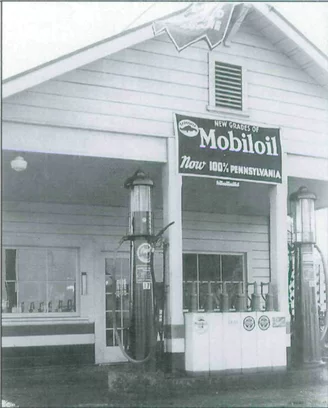
The shop and gas station of the author’s father, Mike Olsen. This photo was taken before the fire that started when someone tossed a lit cigarette into a bucket of gasoline used to clean car parts. Right away, the Olsen family and friends got to work rebuilding it.
Pennies were rare. Once in a great while we went to our dad’s repair shop next door to our house, and asked him for a penny. He showed us how to open the office till and let us each take one penny. Four brass keys like the keys on a piano hid under a metal shield on the left hand side of the oak till. We pressed the secret combination of the top and bottom keys with our pointer and pinky fingers, pushed a brass button on the corner of the till with our thumb, and the cash drawer opened with a little bell-like noise: “Ka-ching!” Our father trusted us with this knowledge and we did not betray his trust. We told no one else how to open the cash drawer. Not until this very moment. One penny each was all we took, and we never took pennies without his permission.
We ran almost as fast as the streetcar traveled the short distance to Christiansen’s corner grocery store, where we could buy ten wrapped candies for a penny, or one purple grape-flavored sucker shaped like a lion’s head, or a strip of paper with little candy dots all in a row. Red, green, white, yellow. For five cents, Mr. Christiansen cut off a rectangle of Ghirardelli’s milk chocolate from a large block of chocolate an inch thick, scored in rectangles of two inches by three inches. This was my favorite treat. I nibbled on my piece of chocolate if I had one, like a little mouse and tried to make it last as long as possible, but I rarely had a nickel to buy chocolate. If we dropped our pennies on the way to the store, they might disappear between the cracks of the wooden sidewalks that edged Harris Street in front of the cow pasture next to our house. A wooden sidewalk also ran along the empty block between J and K Streets, across the street from the streetcar barns. Then we needed to find some chewing gum to put on a stick and try to get the penny back.
My older sister, Pat, and her best friend, Francis Naas, who lived across the street from us, used to ride the streetcar downtown to the Carnegie Library on Seventh and F Streets. They must have been at least twelve years old, as the fare for them was five cents each way—the adult fare. They would bring home four books apiece, the maximum number the library allowed, and spread them out on Fran’s front porch in the sun, where they spent many peaceful hours reading. The girls had a rule that they could not peek in the back of the book to find out what happened, but must read the book all the way through.
Cement sidewalks edged the corner of Harris and J in front of the car barns, making a wonderful place to roller skate. Betty and I put on our roller skates and fastened them with a skate key that tightened the skate clamps onto the soles of our shoes. Leather straps buckled around our ankles. We skated half a block along J Street on one side of the streetcar barns, turned the corner and skated another half block in the other direction along Harris Street. Sections where the streetcar tracks entered and exited the barns were difficult to maneuver, but the smooth sidewalks were ideal for skating.
###
Frank Frost, conductor of car 13, at Myrtle and Harrison Avenues.
And now back to the day of my new apple green raincoat. Before I reached my street on my way home from Marshall School that gray day, black clouds spilled their contents over Eureka. The sky turned into a leaky sieve above my head. Huge drops splattered down. Wind nearly knocked me over. I was elated. This was the perfect chance to test my new raincoat. In no time at all, the deep redwood rain gutters edging the wooden sidewalks ran full to overflowing. 1 held my new raincoat together, tucked my head under the cellophane hood, and walked faster.
Across from the car barns, on the northwest corner of Harris and J Streets, stood a vacant lot where alder trees and willows grew among ferns and salal bushes. Wild blackberry vines sent out their runners onto the wooden sidewalk. As I reached the end of this block, a gust of wind caught my cellophane raincoat and ripped it up the back. The hood fell from my head. Cold water trickled down my neck. I shivered. My shredded raincoat hung from my shoulders. Buckets of rain fell from the sky. I could see my house across Harris Street, cold and wet with rain weeping from its eaves. The wet holly trees on either side of the front porch steps glistened like patent leather. My father’s service station and shop on the other side of the house appeared hazy through the downpour.
Sheets of water covered the intersection of Harris and J Streets and splashed with each step I took as I crossed the street. I ran the half block to my house and sloshed up the stairs to the front porch where I stood under the roof overhang, dripping rain from the tatters of my once beautiful raincoat. It had definitely not passed its first and only test. The familiar “Clang! Clang!” of the streetcar filled the air. I turned to watch it go by. Passengers rode inside out of the rain, warm and dry, not wet and soggy like me.
The street car wended its way along Harris Street, past my father’s shop and past the General Hospital between H and I Streets. It rocked back and forth as it trundled along toward E Street and the big wooden water tanks on the corner. Its metal wheels complained on the metal rails, and polished them smooth. The Eureka Electric Car Line streetcar disappeared in the rain.
###
The story above was originally printed in the Summer 2009 issue of The Humboldt Historian, a journal of the Humboldt County Historical Society, and is reprinted here with permission. The Humboldt County Historical Society is a nonprofit organization devoted to archiving, preserving and sharing Humboldt County’s rich history. You can become a member and receive a year’s worth of new issues of The Humboldt Historian at this link.
OBITUARY: Wendy Sue Nemcosky, 1978-2023
LoCO Staff / Saturday, May 20, 2023 @ 6:56 a.m. / Obits
It is with broken hearts that we must announce that Wendy Sue
Nemcosky passed away April 29, 2023, at the young age of 44, due to
acute kidney failure. Born on August 11, 1978, in Arcata, Wendy was a
beloved fiancé, daughter, sister and aunt.
Wendy Sue attended Blue Lake Elementary School. When she graduated eighth grade in 1992 she was voted most athletic, and played basketball, softball and was an avid bowler. She went on to attend Arcata High School where she continued to play softball and remain active in her bowling league. Wendy graduated Arcata High School in 1996 with many great lifelong friends.
During her senior year Wendy started working at Arcata Bowl as a short order cook at night, where upon turning 21 years old, she was trained to be a bartender. When Arcata Bowl closed in 2000, she continued bartending at E & O Lanes along with working the bowling alley. It was this profession that allowed Wendy to meet so many diverse, wonderful people, many of whom would turn out to be lifelong friends, if not a second family.
Wendy Sue had many adopted kids at the bowling alley who she loved to spoil by buying them a Shirley Temple or a Roy Rogers. At the bowl, Wendy loved to play liars dice, cribbage or a good game of pool with her customers.
Wendy Sue met her fiancé Jimbo Harris at E & O Bowl in 2008, when he was bowling league. They have lived together in Trinadad for the last six years with their beloved fur babies Koda and Brutus.
In June of 2019, Wendy decided she needed a change in careers and she started working at Wing Inflatables, where she worked until her passing. Wendy loved her job there, especially working alongside her buddy Duck. Wendy told many stories of the fun and laughs they had working together.
My daughter Wendy was known for her twisted sense of humor, sassy attitude, giant smile, and infectious laugh that I will forever keep with me. She could not contain her excitement of seeing someone she hadn’t seen in a while and she would do her little giddy-up dance and give them the biggest smile and hug ever.
Wendy was a free spirit who lived her life on her terms. She was fiercely independent, never afraid to speak her mind, and always true to herself. Her unique personality and zest for life touched the hearts of everyone who knew her. Wendy will be deeply missed by her parents, brothers, fiancé, aunts, uncles, cousins, and a multitude of friends who cherished her company. Her passing has left a void in their lives that can never be filled. Although her time on earth was short her impact will be felt for years to come.
Wendy Sue was born to Nick Nemcosky and Darcy (Netz) Malsom. She is survived by the love of her life, her fiancé James (Jimbo) Harris Jr., father Nick Nemcosky and his partner Heather Knauff, mother Darcy (Netz) Malsom and step-father Bruce Malsom, her older brother Jonathan Nemcosky, younger brothers Brandon Nemcosky and Dustin Corder, step-sister Melissa Barto and husband Tom Barto, step-sister Dawn Strauss, her very special Uncle Gerald (Beaver) Stillwell and Aunt Tina Stillwell, her very special Aunt Michelle Calvert and husband Brian Calvert, beloved nephews Jaron Nemcosky and Marley Harris, and her Godson Chad Blickenstaff and best friend Jennifer Kuwahara, many other aunts, uncles, cousins, nieces, nephews, and extended family.
Wendy was preceded in death by her stepsister Amber (Hardy) Miller, Grandmas Coralie (Blickenstaff) Smith and Glenes (Wantt) Leggett, and Grandpa’s Rudolph (Nick) Nemcosky and Theron Morris.
A celebration of life for Wendy will be held Sunday, June 4, at the Sapphire Palace at Blue Lake Casino from 1-4 p.m. There will be a deli lunch buffet available for service attendees.
###
The obituary above was submitted on behalf of Wendy Nemcosky’s loved ones. The Lost Coast Outpost runs obituaries of Humboldt County residents at no charge. See guidelines here. Email news@lostcoastoutpost.com.
















